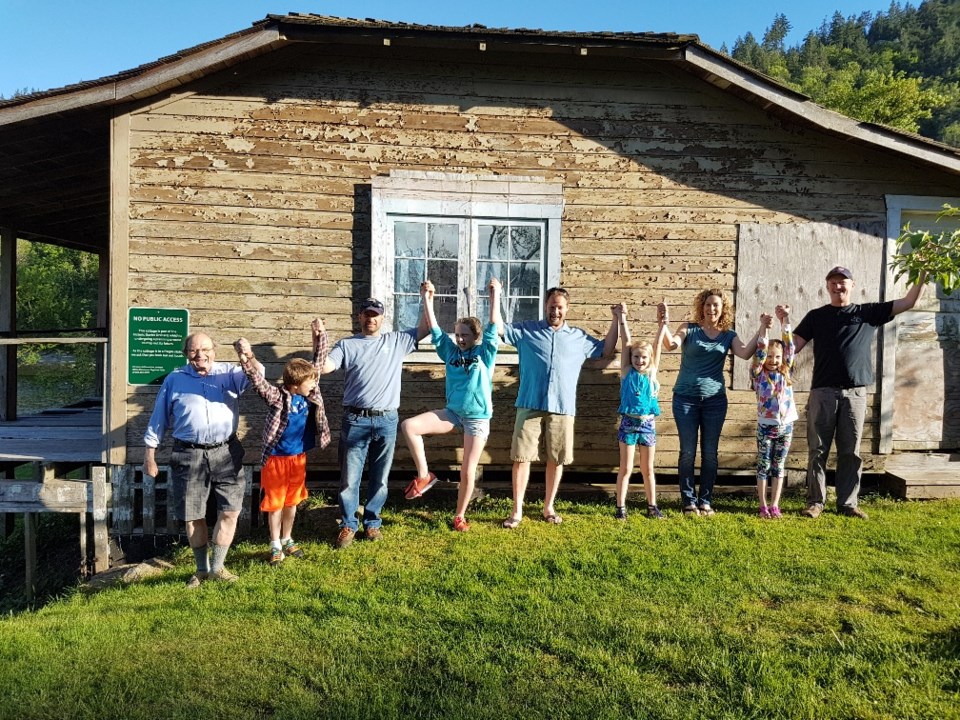In the second installment of this story, Hans and his wife Marianne encountered a Bowen Island littered with No Trespassing signs, but in 1971, a friend encouraged Hans to return and brought him to the new development at Bowen Bay, this is where this week’s story begins:
In the faint January light there lay a profound stillness over the water and rocky shore letting me feel an unexpected serenity.
The following day I brought Marianne. After inhaling the atmosphere at the beach we went up the dirt road and fell in love with two large lots.
On February 1st, 1971 began our life on Bowen. Two weeks later, with septic and electrical permits (building regulations did not come into effect until 1974) I started to build our house.
In 1977 we moved permanently and settled in “circle” on Lenora. The older boys went to elementary school (now Bowen Court) and the younger two to much loved Lynn van Lidth’s Kindergarten at Collins Hall where young parents met. Thus began our connection to the Bowen Island Community.
Those were the formative years giving shape to the aspirations for a variety of interests. The newly formed Community School Association had a profound impact on life at the school, especially when a new building opened its doors in 1980. The prime movers were Claus Spiekermann and Gail Taylor.
BowFest became a well organized two-day event, the Arts Council was formed and the Parks and Recreation Commission began programming. The Garden Club, the Bowen Island Foundation and the Conservancy, the Improvement Association, later the Eco Alliance and the Bowen Island Horse Owners and Riders Association were created and these have survived to this day, with some changes.
Other vital organizations existed since the sixties, even fifties like the Volunteer Fire Department, the Rod and Gun Club (now the Fish and Wildlife Club) and the Historians.
The disappearance of the Union Steamship Company as the dominant employer and social entity on Bowen left a vacuum which took decades to fill.
While developments in various parts of the Island brought a steadily increasing flow of people to the island, the former USSC lands fell into decay. The undeveloped land mass was purchased by a land developer. When he went bankrupt various portions fell into the hands of creditors amongst them the approximately 600 acres including the Orchard and the bulk of the cottages above the lagoon.
The purchase of that land, now known as Crippen Park was purchased by the Greater Vancouver Regional District and perceived as a rescue from ruthless development.
Gradually, the cottages (more than 100 of them) were dismantled, collapsed and removed. The last one alongside Trunk Road served as Bowen’s Post Office for a time.
Slowly and sadly the aura of Bowen’s glory years vanished. I am glad Mrs. Talbot never saw her paradise in ruins. She died in 1981 but was happy we had settled here.
The last reminders of Western Canada’s most important seaside resort in the twentieth century are the ten cottages of the Davies Orchard.
Metro Parks, the owner, does not include management of habitable structures in its mandate and has been undecided what to do with the buildings. Four cottages are in good repair and one serves as museum, one as an office/ information centre for the Heritage Association and two are rented by occasional visitors. Another two have been partially restored but four cottages need urgent repairs.
Within the next few months Metro Parks will decide whether to fully restore the two just mentioned and to remove four or to tear all six down.
This has been proposed in two options, and Metro Parks will present these to Bowen Islanders on Saturday, June 17.
Unfortunately, any proposal from our community in favour of conservation has been ignored.
The Heritage Preservation Association BIHPA with support from the Museum and Archives proposes a third option that seeks to restore and put to public use all ten cottages.
This would require a lease agreement with Metro, formation of a management group for the restoration and one for the management of later uses with a focus on economic viability.
A variety of Bowen trades have generously offered their talents toward this end.
This process would give Crippen Park a special tourist attraction and Bowen Islanders a strong sense of preserving their heritage: a win-win situation for all.
Please come to show your support to save ALL the cottages at 10:00 am on Saturday, June 17.



